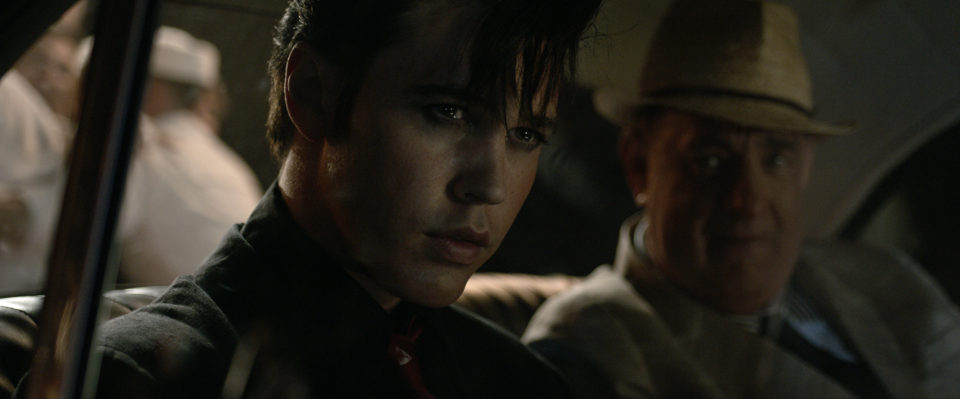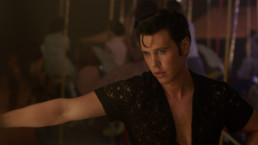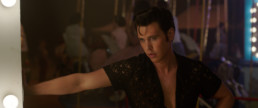‘Elvis’: Baz Luhrmann’s Wildly Operatic Bio Pic Is Fit For A King
Directed by the unapologetically showy maximalist Baz Luhrmann, 'Elvis' doesn't set out to be anyone's traditional bio pic.
Where to watch: ‘Elvis’ is now playing in theaters nationwide.
The biggest thought I had while leaving the building after watching Elvis was, “Boy… that was a lot.” Director Baz Luhrmann (Moulin Rouge!) succeeds in bringing the King of Rock and Roll’s outlandish life story to the big screen in the most oversized, music-filled way imaginable. And yet, after being visually overloaded with this hyper-real staging of the rise-and-fall of Elvis Aaron Presley over 159 minutes, I also felt an unexpected solemnity. Surprisingly, an emotional connection had been forged with the man who, in real life, died a parody of his former self, but who in this sensationally operatic version of a bio-pic remix is given new life in his depiction as a lonely but culture-changing star.
With its high-flying camerawork and neck-snappingly quick editing, it’s clear from the start that Elvis doesn’t intend to play by the same rules that have kept other recent rock icon bio pics earth-bound. Baz Luhrmann–the unapologetically showy maximalist that he is–very much puts his visual stamp and spin on things here, even to the extent that, on the whole, the film largely overpowers the iconic entertainer’s own star power. But it’s this free-wheeling, unrestrained spirit that makes for a wholly unique viewing experience and tells Elvis’s story in a fresh and exciting new way.
Beyond Elvis‘s singular style, the other key device that makes the film more than a traditional bio pic is the story that Luhrmann and Jeremy Doner choose to tell here (both also share screenplay credit with Sam Bromell and Craig Pearce). Elvis is not just the story of the Memphis-born singer only, but also that of his lifelong manipulative manager, Colonel Tom Parker, who many believe was largely responsible for not only Elvis’s fall from grace, but even his premature death. A slippery snake oil salesman whose backstory is as unbelievable as his self-given suffix, “The Colonel” is here payed by Tom Hanks (whose combination of prosthetics and ambiguously European accent result in something between Cristoph Waltz and Foghorn Leghorn).
The Colonel’s gleefully mischievous narration that opens the film and pops up throughout feels like a dark wizard ominously stirring a cauldron. We see that Elvis’s story starts where The Colonel’s begins: as a traveling circus leader promoting circus freaks and country singers through rural Americana. Always looking for the next attraction, he nearly dismisses a new Blues artist singing “That’s All Right” on a nearby record player, until he learns with amazement: “He’s whiiiite?” The potential opportunity for commercial success is instantly sparked, leading to chasing down his new fixation. After seeing young Elvis’s (Austin Butler) power of possession to entrance the youth through his electrically arresting hip-shaking gyrations (which comically recalls 2001‘s early ape howls of new self-consciousness), he dangles a career to him like an evil genie. Young and naive and fueled by his love of music, Elvis agrees to The Colonel’s proposal, and it’s off to a future and relationship that would change the world.

Elvis is definitely at its weakest when it feels obligated to play out the Greatest Hits moments of his life. Definitely narratively overstuffed, it’s tough for the film to build any real sense of varying levels of drama, making every scene “the most” of what it can be. The other big swing that the film unfortunately misses is its attempt to link The Colonel and Elvis’s stories of self-made creation together in similar fashion (a thematic through-line that also runs through Baz’s remake of The Great Gatsby). “You and I are the same, my dear boy,” The Colonel reminds Elvis and the audience throughout the film, which furthers the plot more so than any real emotional stakes.
Elvis is at its best and most captivating when it’s not narratively bound. Baz Luhrmann’s canvas is not one of realism, but expressionism. When the film wishes show how it might have felt experiencing Elvis’s stardom at the time, it’s electric. Going all the way back to seeing a Young Elvis (Chaydon Jay) wander into a Gospel-bumping tent and becoming possessed by the sweat-filled claps and shakes from the African American community, is heart-pounding. Hearing the distortion-laced electric guitar solo that accompanies Elvis’s first dance moves, is gripping. And living through Elvis’s final years, playing out a Vegas residency that would become his elephant’s graveyard, is heartbreaking to watch him shut away in that hotel.
Austin Butler as Elvis is not just good. He very well might have been born to play Elvis in a big screen movie. What’s beyond impressive–besides the fact that Butler is able to talk, sing, and dance like the singer–is that he impersonates the entertainer impeccably at every stage of his life; from early break through, to middling mid-career, to sweat-faced final act. His mannerisms are perfect, and perfect for each stage, turning in a performance that’s nothing short of passionate, committed, and phenomenal.
Now, Elvis is not perfect. The movie is certainly superficial and surface-level, and it really isn’t designed to create nuanced drama. Its first act is wonderful, but when the movie down shifts into its second and third acts, the story loses just a bit of momentum. But Elvis tells the story of an American icon in such a way that gives the man newfound respect, coloring him as a person whose past was more tragic than we knew. By the time the film approaches its finale–the chips of his life in pill-popping disarray–we’re met with one of the most arresting musical sequences in the form of a rendition ofUnchained Melody that blends fiction and reality marvelously. During his final public performance, and underneath all the glitz and grandeur, we hear and feel the presence of a young singer who might have only ever wanted to be free.
Ryan Rojas
Ryan is the editorial manager of Cinemacy, which he co-runs with his older sister, Morgan. Ryan is a member of the Hollywood Critics Association. Ryan's favorite films include 2001: A Space Odyssey, The Social Network, and The Master.


